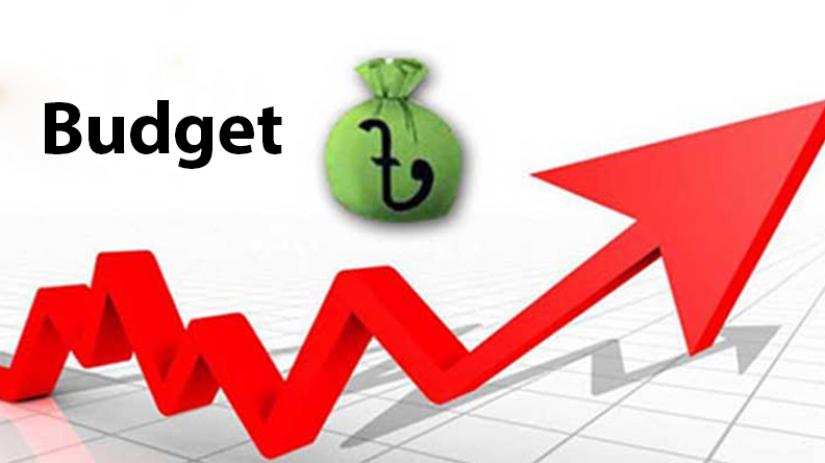 Accelerating investment, generating employment and optimizing revenue income are the major daunting tasks for Finance Minister AHM Mustafa Kamal in the next fiscal year.
Accelerating investment, generating employment and optimizing revenue income are the major daunting tasks for Finance Minister AHM Mustafa Kamal in the next fiscal year.
With the manifold economic challenges ahead, Kamal, a businessman-turned politician, unveils his first national budget of Tk 5231.9 billion in parliament on Thursday (Jun 13) aiming to win hearts of a diverse group of people.
The nation is eagerly waiting to see Kamal’s charisma, vision, and fiscal tools to be proposed on Thursday to step up one of the fastest growing economies in the world.
The budget is also the first one for the re-elected Awami League government.
While Gross Domestic Product (GDP) growth projection of 8.20% for 2019-2020 fiscal year is likely to be envisioned in the budget speech, economists have pointed fingers on stagnant private-sector investment ratio to GDP, and prospects of achieving the targeted economic growth.
They have said pushing up the private sector investment to GDP, which has been hovering between 22% and 23.5% since 2011, is of immense importance for sustainable economic expansion and job creation for millions.
Investment of private sector rose only 1.37% of GDP since 2013-14 when it was 22.03%, according to data of Bangladesh Bureau of Statistics (BBS).
They say “value of money” must be ensured in budgetary expenditure, as quality spending is key to get expected returns from public sector investment.
Fixing the battered banking sector, and plugging holes facilitating money siphoning, although the vices are not directly linked to budget rather than being integral part of economic management, should be focused in the budget for a transparent fiscal management system in the economy, economists said.
“Augmenting revenue, ensuring the ‘value of money’ and containing unproductive expenditure are three major challenges the finance minister will face while implementing budget for the 2019-2020 fiscal year,” said Ahsan H Mansur, executive director of Policy Research Institute.
He said private sector investment is linked to both propelling growth and job creation, while earning targeted revenue would consolidate the economy for further expansion with reducing deficit financing.
Elaborating the term “value of money,” Mansur said return in the economy against investing money in certain sectors like education, infrastructure, and safety net program is fundamental in terms of expenditure both in the heads of revenue and development perspective.
The targets
It is learnt that the total revenue target for the upcoming fiscal year has been set at Tk 3778.1 billion, up by 17.92% than the revised target for the outgoing fiscal year.
The revenue target for the National Board of Revenue (NBR) for the next fiscal year has been set at Tk 3256 billion, non-NBR Tk 145 billion and non-tax revenue income target at Tk 377.1 billion, according to the draft budget document.
While the NBR, which typically earns more than 80% of total revenue, registered only 7.1% growth in the first nine months of the current fiscal year, the next total revenue growth target of 17.92% is unrealistic to achieve, and thus ambitious.
Pinning high hopes on enhanced revenue generation, the finance minister plans to generate Tk 3256 billion alone from NBR.
Expanding and enforcing the indirect tax — Value Added Tax (VAT) — is riding Kamal’s expectation high to earn hefty tax income from consumers and small businesses.
It is to be seen how Kamal navigates from the hassle and tussle, the business community is expected to stage after he announces VAT and Supplementary Duty Act, 2012 in Thursday’s budget, to be implemented from Jul 1.
“The new VAT act is the only tool for the finance minister to earn more, while it will be a source of contention between the government and the business community,” said former Bangladesh Bank governor Salehuddin Ahmed.
He said one of the major challenges the minister is set to encounter is striking a balance between income and expenditure.
“On the back of huge revenue shortfall in the current budget, the finance minister is going to announce yet another jumbo sized revenue target,” he said.
Pointing on other major challenges, Salehuddin said the government would face tough resistance in implementing the VAT act, creating employment generation and boosting private sector investment.
According to the Economist Intelligence Unit, 47% graduates in the country were unemployed in 2016, while the rate is 10% for India and Pakistan.
On the other hand, BBS data says the country had 26,77,000 jobless people in 2017. Of the total, 40% was educated youth of the country.
Deficit and more challenges
On the borrowing front, the upcoming fiscal budget has set a target of borrowing only Tk 265 billion from savings tools and Tk 548 billion from banks.
Besides, borrowing target from foreign sources for deficit financing has been set at Tk 605.8 billion, which was Tk 605.85 billion in the outgoing fiscal year.
According to the draft budget document, total budget deficit for the upcoming fiscal year is Tk 1453.8 billion, which is 5% of next year’s GDP.
The budget deficit for the outgoing fiscal year is Tk 1212.42 billion, sources said.
Mirza Azizul Islam, former finance adviser to a caretaker government, said that major challenges ahead are increasing private sector investment to rekindle the economy, augmenting revenue income, and addressing the inequality of income distribution to reduce poverty rate.
“The multipronged challenges in the areas of revenue earnings, poverty reduction, spurring private sector investment along with creating employment will be the major challenges for the finance minister,” he said.
The proposed budget is also likely to offer whitening facility for black money and undisclosed income.
The offer, if made in the budget, would cause much criticism from opposition, social media and mainstream media outlets, effectively bypassing VAT related unease for the government, said an analyst.
 National
National
31059 hour(s) 26 minute(s) ago ;
Evening 10:20 ; Thursday ; May 02, 2024
Daunting challenges await Kamal to fix investment, revenue, jobs
Send
Nazmul Ahsan
Published : 09:48, Jun 13, 2019 | Updated : 13:00, Jun 13, 2019
Published : 09:48, Jun 13, 2019 | Updated : 13:00, Jun 13, 2019
0 ...0 ...
/pdn/
Topics: Top Stories
- KOICA donates medical supplies to BSMMU
- 5 more flights to take back British nationals to London
- Covid19: Rajarbagh, Mohammadpur worst affected
- Momen joins UN solidarity song over COVID-19 combat
- Covid-19: OIC to hold special meeting
- WFP begins food distribution in Cox’s Bazar
- WFP begins food distribution in Cox’s Bazar
- 290 return home to Australia
- Third charter flight for US citizens to return home
- Dhaka proposes to postpone D8 Summit
Unauthorized use of news, image, information, etc published by Bangla Tribune is punishable by copyright law. Appropriate legal steps will be taken by the management against any person or body that infringes those laws.
Bangla Tribune is one of the most revered online newspapers in Bangladesh, due to its reputation of neutral coverage and incisive analysis.
F R Tower, 8/C Panthapath, Shukrabad, Dhaka-1207 | Phone: 58151324; 58151326, Fax: 58151329 | Mob: 01730794527, 01730794528


